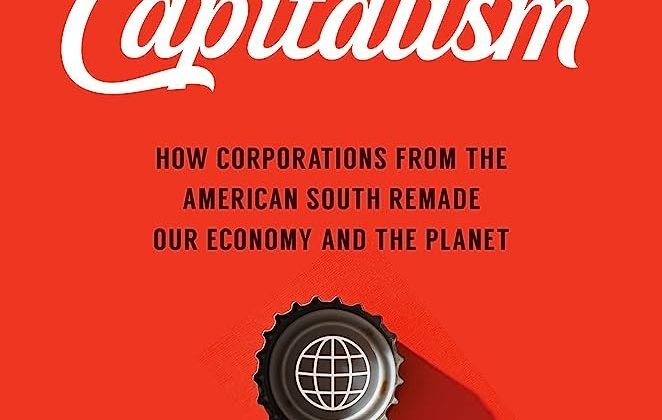

Bart Elmore is Professor of Environmental History at The Ohio State University. This interview is based on his new book, Country Capitalism: How Corporations from the American South Remade Our Economy and the Planet (University of North Carolina Press, 2023).
JF: What led you to write Country Capitalism?
BE: I grew up in Atlanta, Georgia, in the 1980s and 1990s and on my drive to school every day, I would pass by the headquarters of booming business, such as Coca-Cola, Delta Airlines, and CNN. Yet, when I went off to the University of Virginia to study the environmental history of the American South, I felt that much of the literature focused on the story of agriculture and extractive industries–cotton fields, tobacco growers, timber companies, and mining firms. To me, there was a much bigger story to be told when it came to southern business, one in which the American South was not just the site of ecological harm, but also the center of a logistics revolution in retail, finance, and transportation that had global environmental consequences well beyond the borders of the southland. This book was an attempt to tell that story by looking at five southern firms: Coca-Cola, Delta Airlines, Walmart, FedEx, and Bank of America.
JF: In 2 sentences, what is the argument of Country Capitalism?
BE: The argument of the book is that the rural roads to our “Amazon” economy ran straight through the American South. All the businesses featured in this book grew big by trying to figure out how to service the countryside and less urban areas in a region that was more rural than many other parts of the country, and those efforts to engage in country capitalism led them to develop unique logistics strategies that became central to what Jeff Bezos and his Amazon firm do today.
JF: Why do we need to read Country Capitalism?
BE: People should read this book to gain a better understanding of our how our fly-by-night, have-it-now, buy-on-credit economy came to be in the twentieth and twenty-first centuries. It should make us ponder how our obsession with immediate consumption of certain goods and services affects the health of our planet. I certainly wrote this with historians in mind, but I also hope the sustainability officers and executives inside these companies and inside businesses in related industries will read this and consider some of the lessons learned from the past that can help us create a more eco-conscious economy.
JF: Why and when did you become an American historian?
BE: I was a latecomer to this profession. I started college with a keen interest in biochemistry and the medical profession and even worked at the CDC in Atlanta, Georgia, my college freshman summer. After I graduated, I explored different careers, working at an international law firm and teaching high school in Savannah, Georgia. In time, I came to see the power of history and ultimately went off to graduate school to try and use the past to help solve problems facing society today. When I found environmental history in my second year of graduate school, a field that looks at the relationships between humans and the natural environment, I was hooked. This subfield allowed me to combine my interests in environmental science with my passion for history in ways that keeps me happily plugging along even today!
JF: What is your next project?
BE: I have an idea of what I’m writing about next, but I’m not sharing at this point because I don’t want to jinx what I think will be a really cool project : )
JF: Thanks, Bart!